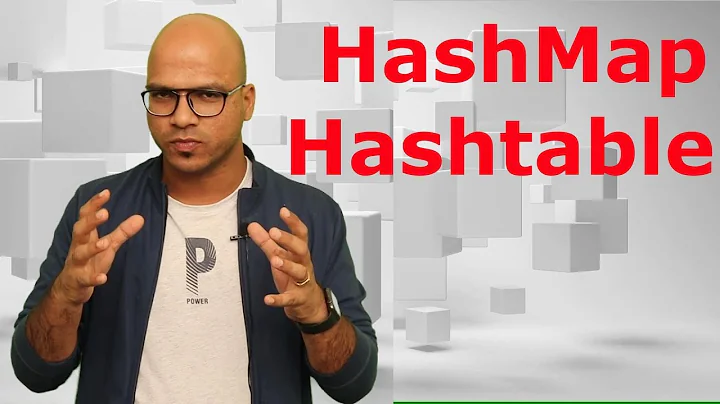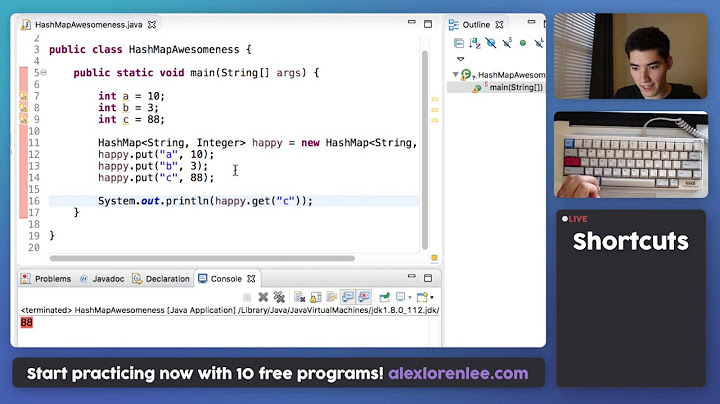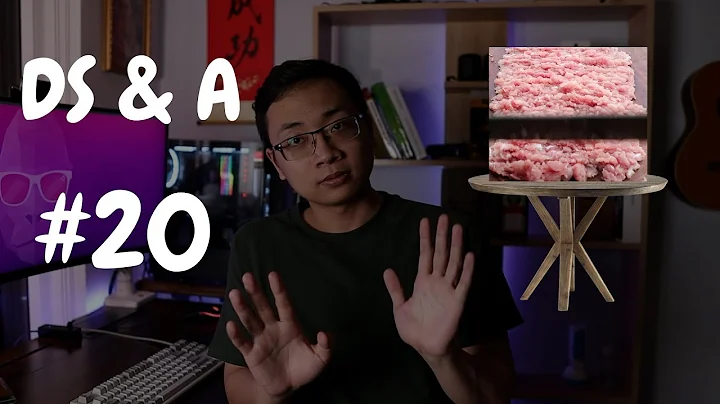Multi-valued hashtable in Java
Solution 1
No. That's kind of the idea of hash tables.
However, you could either roll your own with a Map<YourKeyObject, List<YourValueObject>> and some utility methods for creating the list if it's not present, or use something like the Multimap from Google Collections.
Example:
String key = "hello";
Multimap<String, Integer> myMap = HashMultimap.create();
myMap.put(key, 1);
myMap.put(key, 5000);
System.out.println(myMap.get(key)); // prints either "[1, 5000]" or "[5000, 1]"
myMap = ArrayListMultimap.create();
myMap.put(key, 1);
myMap.put(key, 5000);
System.out.println(myMap.get(key)); // always prints "[1, 5000]"
Note that Multimap is not an exact equivalent of the home-baked solution; Hashtable synchronizes all its methods, while Multimap makes no such guarantee. This means that using a Multimap may cause you problems if you are using it on multiple threads. If your map is used only on one thread, it will make no difference (and you should have been using HashMap instead of Hashtable anyway).
Solution 2
Values of a hash table is Object so you can store a List
Solution 3
In a hashtable, one would use a key/value pair to store information.
In Java, the Hashtable class accepts a single value for a single key. The following is an example of an attempt to associate multiple values to a single key:
Hashtable<String, String> ht = new Hashtable<String, String>();
ht.put("Answer", "42");
ht.put("Hello", "World"); // First value association for "Hello" key.
ht.put("Hello", "Mom"); // Second value association for "Hello" key.
for (Map.Entry<String, String> e : ht.entrySet()) {
System.out.println(e);
}
In an attempt to include multiple values ("World", "Mom") to a single key ("Hello"), we end up with the following result for printing the entries in the Hashtable:
Answer=42
Hello=Mom
The key/value pair of "Hello" and "World" is not in the Hashtable -- only the second "Hello" and "Mom" entry is in the Hashtable. This shows that one cannot have multiple values associate with a single key in a Hashtable.
What is really needed here is a multimap, which allows an association of multiple values to a single key.
One implementation of the multimap is Multimap from Google Collections:
Multimap<String, String> mm = HashMultimap.create();
mm.put("Answer", "42");
mm.put("Hello", "World");
mm.put("Hello", "Mom");
for (Map.Entry<String, String> e : mm.entries()) {
System.out.println(e);
}
This is similar to the example above which used Hashtable, but the behavior is quite different -- a Multimap allows the association of multiple values to a single key. The result of executing the above code is as follows:
Answer=42
Hello=Mom
Hello=World
As can be seen, for the "Hello" key, the values of "Mom" and "World" associated with it. Unlike Hashtable, it does not discard one of the values and replace it with another. The Multimap is able to hold on to multiple values for each key.
Solution 4
Rather than give yet another multipmap answer, I'll ask why you want to do this?
Are the multiple values related? If yes, then it's probably better that you create a data structure to hold them. If no, then perhaps it's more appropriate to use separate maps.
Are you keeping them together so that you can iterate them based on the key? You might want to look for an alternative indexing data structure, like a SkipList.
Solution 5
As others pointed out, no. Instead, consider using a Multimap which can map many values for the same key.
The Google Collections (update: Guava) library contains one implementation, and is probably your best bet.
Edit: of course you can do as Eric suggests, and store a Collection as a value in your Hashtable (or Map, more generally), but that means writing unnecessary boilerplate code yourself. When using a library like Google Collections, it would take care of the low-level "plumbing" for you. Check out this nice example of how your code would be simplified by using Multimap instead of vanilla Java Collections classes.
Related videos on Youtube
Jonik
I'm a generalist software developer who's been programming professionally for 15+ years. Simplicity, code maintainability, easy deployments, automated testing, and continuous integration are some of the things close to my heart as a developer. I currently work as a freelance developer, focused on backend (Java/Scala/JVM mostly) and Android development. Enjoying Kotlin and Jetpack Compose nowadays especially! You can reach me by email through <jonik at iki dot country code for finland>.
Updated on July 09, 2022Comments
-
 Jonik almost 2 years
Jonik almost 2 yearsIs it possible to have multiple values for the same key in a hash table? If not, can you suggest any such class or interface which could be used?
-
Josh almost 15 yearsAwseome 6 people all basically copying and pasting the same answer. sigh
-
palantus almost 15 yearsAwesome, 6 people independently came up with the same answer. Yay!
-
Brett almost 15 yearsI bet it's a dupe question if anyone could be bothered to look rather than just banging in an obvious post.
-
palantus almost 15 yearsI did look, but I didn't see any obvious duplicates. Does anyone else want to try?
-
 Jonik almost 15 yearsI searched too; didn't find. I'd say if a duplicate exists, it is named/tagged in some pretty obscure way
Jonik almost 15 yearsI searched too; didn't find. I'd say if a duplicate exists, it is named/tagged in some pretty obscure way -
Steve Kuo almost 15 yearsRelated question stackoverflow.com/questions/1010879
-
 Jonik almost 15 yearsStrangely, now there exists an exact duplicate: stackoverflow.com/questions/1052120/dictionary-class. Also posted by someone called Raji, but as different unregistered user, some 12 hours after this.
Jonik almost 15 yearsStrangely, now there exists an exact duplicate: stackoverflow.com/questions/1052120/dictionary-class. Also posted by someone called Raji, but as different unregistered user, some 12 hours after this.
-
-
mnuzzo almost 15 yearsYes you can store a list, but you can't just add an item to it, you'd have to get a reference to the list, then add it to the list.
-
akarnokd almost 15 yearsJust a small remark: HashMap is not synchronized by default so why use Vector in it instead of a List implementation?
-
akarnokd almost 15 yearsCould you please post at least a small sample code for the usage?
-
matt b almost 15 yearsInteresting that it seems like Multimap basically just does Map<YourKeyObject, List<YourValueObject>> under the covers
-
palantus almost 15 yearsYes, it's basically just abstracting away the umimportant details.
-
bendin almost 15 yearsafter reading through other people's answers, I'm forced to conclude that my advocacy for the google collections api wasn't very original. (It's a good piece of work, no?)
-
palantus almost 15 yearsWell, the original question was about HashTables, not HashMaps.
-
Josh almost 15 yearsI linked to commons-collections just to be different :-P (Actually it was the first search hit and I was feeling lazy).
-
palantus almost 15 years+1 for looking at the big picture. I keep forgetting to do that.
-
palantus almost 15 yearsI prefer Google Collections because Apache Commons doesn't support generics.
-
 Jonik almost 15 yearsFor more about Google Collections vs. Apache Commons Collections, see javalobby.org/articles/google-collections (search for "Apache Commons")
Jonik almost 15 yearsFor more about Google Collections vs. Apache Commons Collections, see javalobby.org/articles/google-collections (search for "Apache Commons") -
 Jonik almost 15 yearsYes, that's why it's curious that this answer uses HashMap & Vector (instead of Hashtable & Vector or HashMap & ArrayList, etc.) IMO, pedagogically it would be best to use Map & List. :)
Jonik almost 15 yearsYes, that's why it's curious that this answer uses HashMap & Vector (instead of Hashtable & Vector or HashMap & ArrayList, etc.) IMO, pedagogically it would be best to use Map & List. :) -
 Jonik almost 15 years+1, not for originality, but the clarity and thoroughness of the examples :)
Jonik almost 15 years+1, not for originality, but the clarity and thoroughness of the examples :) -
 Jonik almost 15 yearsWith no external libs, this is the way to go. But this is exactly the boilerplate I mentioned in my answer; using Google Collections, addition would be one line, simply: multiMap.put(key, o)
Jonik almost 15 yearsWith no external libs, this is the way to go. But this is exactly the boilerplate I mentioned in my answer; using Google Collections, addition would be one line, simply: multiMap.put(key, o)





![Cấu trúc dữ liệu & Giải thuật [14]: #HashTable | Bảng Băm | #Set & #Map](https://i.ytimg.com/vi/dMyhU07qcgs/hq720.jpg?sqp=-oaymwEcCNAFEJQDSFXyq4qpAw4IARUAAIhCGAFwAcABBg==&rs=AOn4CLBwzg7jJVkIzP5GqKhtiEoByRxD-A)


